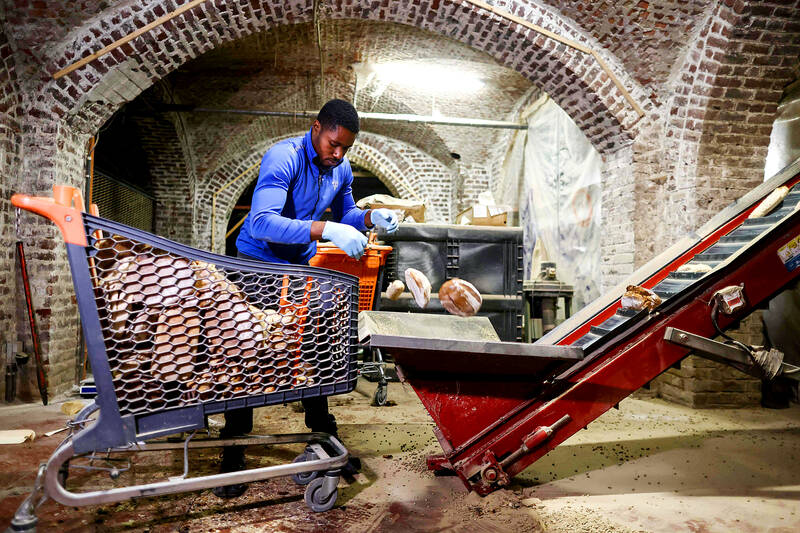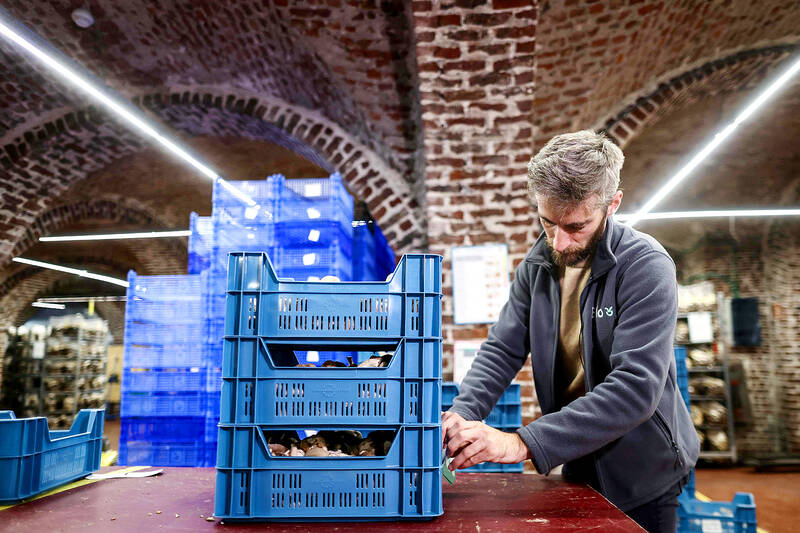In Belgium, a country reputed for its beer, mushrooms nourished on a byproduct from the brew are doing booming business.
The high-end fungi grown by Brussels firm Eclo in a disused abattoir are finding their way to gourmet customers — while boosting the circular economy.
The seven mushroom varieties produced by Eclo are mostly sought-after exotic types usually found in Asia, including shiitake, maitake and pom pom mushrooms.

Photo: AFP
They all fetch premium prices on the firm’s Web site, about 22 euros (US$21.40) for a 750g box, and the substrate — the substance the spores grow out of — is easy to come by in Belgium: a mix of spent grain left over from the mashing process to make beer, and discarded baguettes and dried bread.
“The beer and the bread don’t have any effect on the mushrooms’ taste, but we get better yields from them in terms of quantity and quality,” said Quentin Declerck, one of Eclo’s founders.
His company has for several years been collecting the brewers’ grain from Belgian beermaker Cantillon and leftover bread from Colruyt Group supermarkets and the Bon Pain chain of bakery and sandwich shops.

Photo: AFP
The collaboration enables Eclo to recycle 5 tonnes of brewers’ discarded grain and 18 tonnes of bread annually. That castoff material then goes into Eclo’s cold rooms, where the mushrooms grow in the moist air.
Each week, the company sells between 8 and 10 tonnes of its mushrooms.
Beyond the blooming financial advantage the activity brings, contributing to a domestically made and ecologically friendly production in Brussels is a motivation, Declerck said.
“We realized that many of the mushrooms bought in shops came from the Netherlands, many from eastern [European] countries, and even further afield, from China,” he said. “Today there is a certain production that has been relocalized [to Belgium]. We are part of that movement.”
Eclo was created in 2014 after its founders read a book about the circular economy, in which discarded items are repurposed and reintroduced into the market rather than thrown away. The book spoke of growing mushrooms from coffee grounds — a process already being used by another Brussels company.
Eclo tried that route initially, but “it was a resounding failure” for the varieties it wanted to grow, Declerck said.
“Shiitake doesn’t grow at all in coffee grounds,” he said.
So the company switched direction for its substrate, and trained about 30 people on how to grow mushrooms from brewers’ grain and bread.
The experience has had its ups and downs.
“Some of them just gave up. This is still a form of farming and it’s tough — you work in very moist rooms, sometimes you don’t see the sun all day,” Declerck said.
Trying to compete against industrial-scale rivals also dealt a blow to the morale of some.
“You need to cope with market prices otherwise you simply don’t sell. We’ve found our niche, so we’re able to pay our people fairly, but a lot of projects don’t pay,” Declerck said.
Eclo is testing out other options in its production, for instance seeing if substrate using discarded ground cacao beans. It is also seeking to grow and set up a factory that can sell substrates on the European market.
In Belgium, the number of companies involved in the circular economy grew by one-third between 2019 and last year, a study released this year by the Inoopa start-up found.
Yet there is still a long path ahead: A study for Belgium’s Wallonia region in June found that 60 percent of the companies on its territory did not know at all about the concept of the circular economy.

CHIP WAR: Tariffs on Taiwanese chips would prompt companies to move their factories, but not necessarily to the US, unleashing a ‘global cross-sector tariff war’ US President Donald Trump would “shoot himself in the foot” if he follows through on his recent pledge to impose higher tariffs on Taiwanese and other foreign semiconductors entering the US, analysts said. Trump’s plans to raise tariffs on chips manufactured in Taiwan to as high as 100 percent would backfire, macroeconomist Henry Wu (吳嘉隆) said. He would “shoot himself in the foot,” Wu said on Saturday, as such economic measures would lead Taiwanese chip suppliers to pass on additional costs to their US clients and consumers, and ultimately cause another wave of inflation. Trump has claimed that Taiwan took up to

A start-up in Mexico is trying to help get a handle on one coastal city’s plastic waste problem by converting it into gasoline, diesel and other fuels. With less than 10 percent of the world’s plastics being recycled, Petgas’ idea is that rather than letting discarded plastic become waste, it can become productive again as fuel. Petgas developed a machine in the port city of Boca del Rio that uses pyrolysis, a thermodynamic process that heats plastics in the absence of oxygen, breaking it down to produce gasoline, diesel, kerosene, paraffin and coke. Petgas chief technology officer Carlos Parraguirre Diaz said that in

Japan intends to closely monitor the impact on its currency of US President Donald Trump’s new tariffs and is worried about the international fallout from the trade imposts, Japanese Minister of Finance Katsunobu Kato said. “We need to carefully see how the exchange rate and other factors will be affected and what form US monetary policy will take in the future,” Kato said yesterday in an interview with Fuji Television. Japan is very concerned about how the tariffs might impact the global economy, he added. Kato spoke as nations and firms brace for potential repercussions after Trump unleashed the first salvo of

SUPPORT: The government said it would help firms deal with supply disruptions, after Trump signed orders imposing tariffs of 25 percent on imports from Canada and Mexico The government pledged to help companies with operations in Mexico, such as iPhone assembler Hon Hai Precision Industry Co (鴻海精密), also known as Foxconn Technology Group (富士康科技集團), shift production lines and investment if needed to deal with higher US tariffs. The Ministry of Economic Affairs yesterday announced measures to help local firms cope with the US tariff increases on Canada, Mexico, China and other potential areas. The ministry said that it would establish an investment and trade service center in the US to help Taiwanese firms assess the investment environment in different US states, plan supply chain relocation strategies and